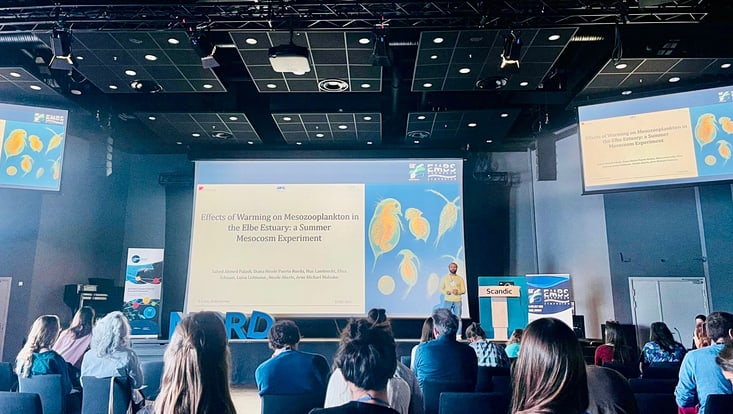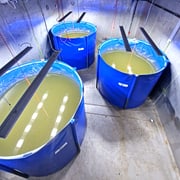Presentation of Results from an Aquatic Mesocosm Experiment of the RTG253058th European Marine Biology Symposium
17 July 2025, by RTG 2530

Photo: UHH/RTG2530/PuertoRueda
From 6 to 9 July 2025, Max Lambrecht, Luisa Listmann, Sahed Ahmed Palash, Diana Nicole Puerto Rueda and Juliane Schulte participated in the 58th European Marine Biology Symposium (EMBS) in Bodø, Norway. This long-established conference has brought together marine biologists from across Europe since the 1960s. At the event, Sahed Ahmed Palash gave a talk on an aquatic mesocosm experiment conducted as part of the RTG2530, in which all five were directly involved in the research.

As part of the RTG 2530, two aquatic mesocosm warming experiments using water from the Elbe estuary were carried out during the summers of 2024 and 2025 by a team effort. In his talk, Sahed Ahmed Palash shared some results from the initial experimental run. For this, 10,000 litres of Elbe water were collected and transported to the experimental laboratory of the Institute of Marine Ecosystem and Fishery Science (IMF). There, the water was distributed between three climate chambers, with three mesocosms, each maintained at 21 °C, 23 °C, and 25°C. One of the aims was to investigate how warming changes influence zooplankton communities in the Elbe estuary.
The results revealed that different zooplankton taxa reacted differently: As temperatures increased, copepods, mostly algae-grazing crustaceans and a key food source for fish larvae, declined, while smaller cladocerans (water fleas) became more dominant. This shift was linked to broader changes in the food web: diatoms disappeared, cyanobacteria flourished, and energy transfer between plankton groups weakened.
Stable isotope analysis, which can be used to infer what animals have eaten, further revealed a decline in the diversity of feeding relationships within the food web and changes in the diets of zooplankton. These results suggest that ongoing warming could destabilise estuarine ecosystems and reduce the reproductive success of fish by disrupting crucial food web connections.


